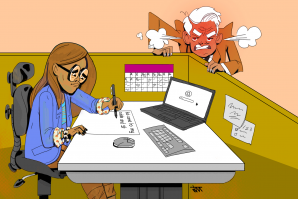I try to handle employee problems face-to-face and one-on-one. That’s what I was always taught — praise in public, punish in private. But the problem with this is that each of my employees feels singled out for their bad behavior. In their eyes, their coworkers never “get in trouble.” No one is getting in real trouble — no suspensions or terminations. Just things like, “Here are the things you need to improve.” I almost feel like a sticker chart where everyone can see everyone else’s progress would work, but I know I can’t do that. What do I do so my employees don’t feel picked on?
It sounds like you are doing the right thing here, but with some unintended consequences. It’s possible that your employees aren’t familiar with the management adage you’re following, and they don’t know that all of their peers are also receiving private feedback. But it’s also possible that you might be a bit too critical of your employees, and they’re right to feel picked on. Here’s how to tackle this issue.
Tell your employees what you’re doing.
The solution may be this simple: In an all-hands meeting, say, “I understand that people feel like I pick on them because of the negative feedback I give. I genuinely apologize. I want you to know that my management philosophy is ‘praise in public, punish in private.’ I’m specifically trying to ensure you get the feedback you need without bringing in other people.”
This may be enough to stop the problem. But if it’s more than that, here are the next steps.
Limit your criticism to things that have a genuine impact.
You want your employees to learn and grow, which means giving them feedback on how to improve, but criticizing them too often does the opposite. If, after every client meeting, you sit down with a list of things they did wrong, they will feel defeated.
So limit negative feedback to essential things. Before making a critique, ask yourself these questions.
- Will this cause us to lose a client? Giving a client the wrong pricing information and then having to go back with a higher dollar figure and saying, “Oops, Jane messed up,” is a serious problem. If your employee throws out an ethnic slur in front of a client, that’s a huge problem. You need to address it right away. (And in fact, if someone uses an ethnic slur in a meeting, you should address it right there, in front of everyone.)
- Will there be a significant negative financial impact? If an employee causes a payroll error that will cost $10k to fix, yes, address that. If your employee forgets to submit a government form that will cause a fine, address that.
- Is this a legal violation? Unless the legal violation is going 3 miles over the speed limit, address legal violations every time. Sexual harassment is a no-go. Religious discrimination stops now. Securities and Exchange Commission filing errors must be handled.
- Is this a behavioral issue that will lead to future problems? Everyone has bad days, but if your employee is bullying other employees, having tantrums regularly or not completing work, you need to address it immediately.
- Is the employee already aware it’s a problem? If your employee forgets to turn off notifications and one from a dermatologist regarding a fungal infection pops up during a PowerPoint presentation, you don’t need to say anything. You can be sure the employee is already embarrassed.
If the answer to all five of these things is no, then you’re probably a bit of a micromanager, and it’s time to go on to the last question:
Is this a problem or a preference?
Sometimes the things we see as problems are just preferences. I do work first and check my inbox after lunch. Some people check their email first thing in the morning. Fonts don’t matter on internal documents. A typo in an internal email is just a typo. A joke that falls flat isn’t a problem.
So many things don’t matter. If you are criticizing things that don’t matter, your employees will feel picked on, even if you’re doing it to everyone. Embrace your inner Elsa and let these things go.
Overall, keep up the praise, and pull back on the criticism. Make sure something is a problem before you address it, and offer support to fix real problems.
Asking yourself the above questions should solve your concern and make your employees feel more secure.
–
Stay up to date on business in the Capital Region: Subscribe to the Comstock’s newsletter today.
Recommended For You

Dilemma of the Month: How Can I Change a Company’s Racist Culture?
As a human resources professional, you can’t eradicate people’s racist thoughts. But, Evil HR Lady asserts, you can change the company culture so people know that they cannot get away with harassment.

Dilemma of the Month: Is the Customer Really Always Right?
The customer is not always right — and is sometimes profoundly wrong. Evil HR Lady presents the moral and legal obligations employers have to their employees if a customer harasses them.

Dilemma of the Month: How Do You Document Harassment Without Getting Yourself in Hot Water?
HR people often advise victims of harassment to “just document everything!” without explaining how to go about it. Here’s a quick guide to what you need to do when you’re documenting harassment.

Dilemma of the Month: My Employee Is Lunching With a Player. Should I Warn Her?
An employer seeks answers about the ethics and boundaries of commenting on an employee’s personal life.

Dilemma of the Month: How Can I Attract Entry-Level Candidates Without Raising Pay?
An employer struggles with how to attract entry-level applicants without being able to increase their wages.





Comments
Could it be that "praise publicly, punish privately" is limiting the perception of available praise compared to punishment?
When the writer says praise publicly, I'm picturing a "nice catch" or "good work on X project". Turn around to a private one-on-one meeting with the employee and now the writer spends 30 minutes talking ways to improve. If that's the case, the writer could help to ensure that every one on one meeting isn't an improvement conversation.
Similarly, the public praise may not be perceived as equally (or even fairly). Ideally no one is keeping score but could writer be putting out a perception of favoritism by unconsciously praising some staff more than others?
If neither of those are the issue, perhaps writer could just sit down with the employee when the question comes up and ask how they like to receive praise for work done well. Some people don't like to be singled out publicly and may prefer a private email.